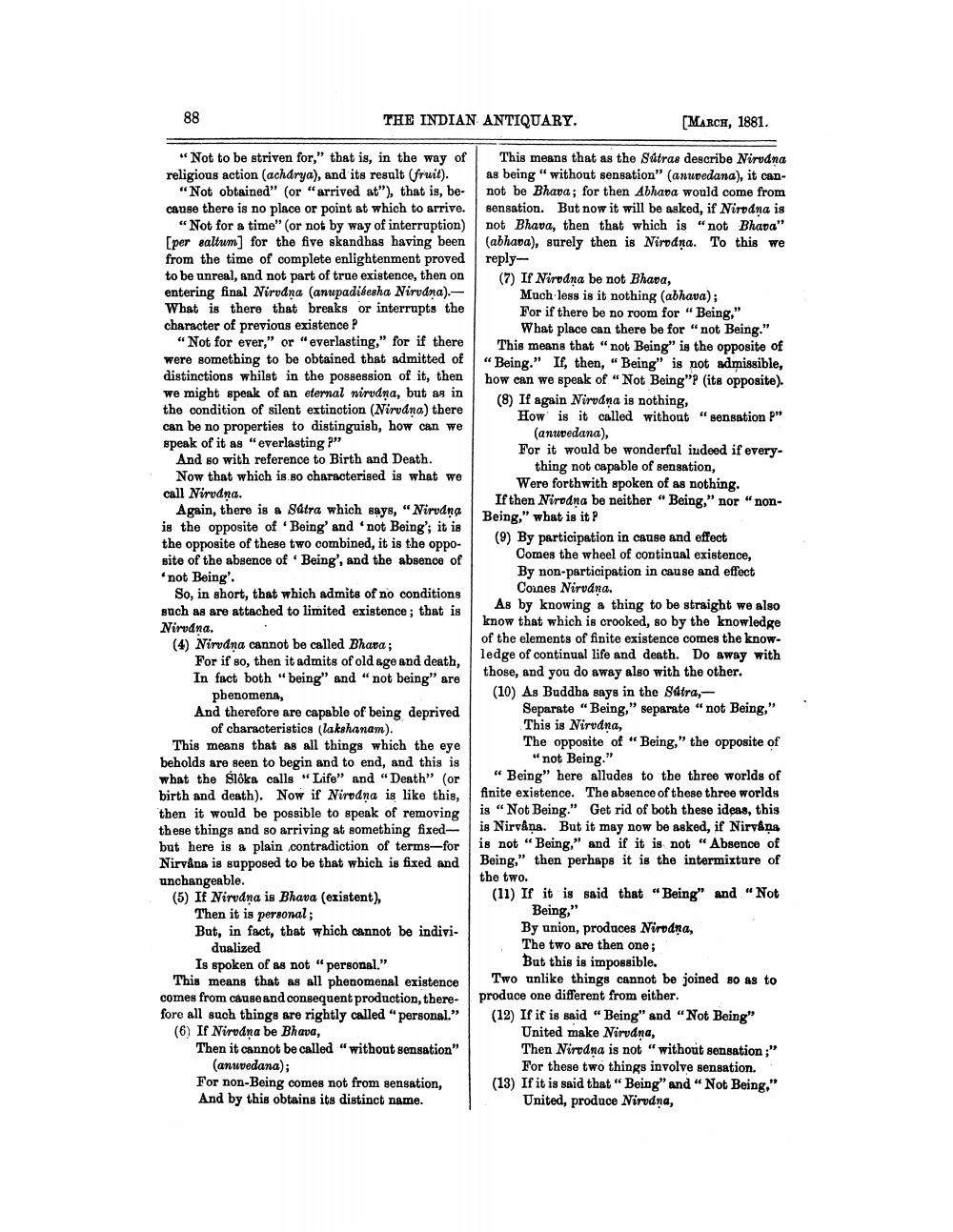________________
88
THE INDIAN ANTIQUARY.
[MARCH, 1881.
"Not to be striven for," that is, in the way of religious action (acharya), and its resalt (fruit).
"Not obtained" (or "arrived at"), that is, be- cause there is no place or point at which to arrive.
“Not for a time" (or not by way of interruption) [per saltum] for the five skandhas having been from the time of complete enlightenment proved to be unreal, and not part of true existence, then on entering final Nirvana (anupaditesha Nirvana). What is there that breaks or interrupts the character of previous existence ?
“Not for ever," or "everlasting," for if there were something to be obtained that admitted of distinctions whilst in the possession of it, then we might speak of an eternal nirudna, but 29 in the condition of silent extinction (Nirvdna) there can be no properties to distinguish, how can we speak of it as "everlasting ?”
And so with reference to Birth and Death.
Now that which is so characterised is what we call Nirvdna.
Again, there is a Sátra which says, “Nirvang is the opposite of Being' and 'not Being': it is the opposite of these two combined, it is the opposite of the absence of Being', and the absence of not Being'.
So, in short, that which admits of no conditions such as are attached to limited existence; that is Nirudna. (4) Nirudna cannot be called Bhava;
For if so, then it admits of old age and death, In fact both "being" and "not being" are
phenomena, And therefore are capable of being deprived
of characteristics (lakshanam). This means that as all things which the eye beholds are seen to begin and to end, and this is what the sloka calls "Life" and "Death" (or birth and death). Now if Nirodna is like this, then it would be possible to speak of removing these things and so arriving at something fixedbut here is a plain contradiction of terms--for Nirvana is supposed to be that which is fixed and unchangeable. (5) If Nirudna is Bhava (existent),
Then it is personal; But, in fact, that which cannot be indivi
dualized
Is spoken of as not "personal." This means that as all phenomenal existence comes from cause and consequent production, there- fore all such things are rightly called "personal." (6) If Nirodna be Bhava, Then it cannot be called "without sensation"
(anuvedana); For non-Being comes not from sensation, And by this obtains its distinct name.
This means that as the Sútras describe Nirvana as being " without sensation" (anuvedana), it cannot be Bhava; for then Abhava would come from sensation. But now it will be asked, if Nirodna is not Bhava, then that which is "not Bhava" (abhava), surely then is Nirvana. To this we reply(7) If Nirodna be not Bhada,
Much less is it nothing (abhava); For if there be no room for "Being,"
What place can there be for "not Being." This means that "not Being" is the opposite of Being." If, then, "Being" is not admissible, how can we speak of "Not Being"? (its opposite). (8) If again Nirvana is nothing, How is it called without "sensation P"
(anuvedana), For it would be wonderful indeed if every
thing not capable of sensation, Were forthwith spoken of as nothing. If then Nirodna be neither "Being," nor "nonBeing," what is it? (9) By participation in cause and effect
Comes the wheel of continual existence, By non-participation in cause and effect
Connes Nirvana. As by knowing a thing to be straight we also know that which is crooked, so by the knowledge of the elements of finite existence comes the knowledge of continual life and death. Do away with those, and you do away also with the other. (10) As Buddha says in the Satra,
Separate "Being," separate "not Being," This is Nirvana, The opposite of "Being," the opposite of
"not Being." “ Being" here alludes to the three worlds of finite existence. The absence of these three worlds is "Not Being." Get rid of both these ideas, this is Nirvana. But it may now be asked, if Nirvana is not "Being," and if it is not "Absence of Being," then perhaps it is the intermixture of the two. (11) If it is said that “Being" and "Not
Being," By union, produces Nirodna, The two are then one;
But this is impossible. Two unlike things cannot be joined so as to produce one different from either. (12) If it is said "Being" and "Not Being"
United make Nirvana, Then Nirodna is not " without sensation;"
For these two things involve sensation. (13) If it is said that "Being" and "Not Being."
United, produce Nirvana,




